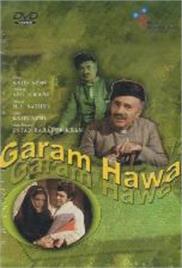Be Careful of Fake Websites. Always use HindiMovies.to domain & Join our Telegram Channel for Latest Updates.

Likes: 1
Views: 1.83K
In post-partition India, a Muslim businessman and his family struggle for their rights in a country which was once their own.
Duration: 146 min
Released: 1975
IMDb Rating: 8.0/10 (340 Votes)
Genre: Drama, Hindi Movies
Stars: Balraj Sahni, Gita Siddharth, A.K. Hangal, Jamal Hashmi
Directors: MS Sathyu
Writers: Shama Zaidi, Kaifi Azmi, Ismat Chughtai
Year: 1973
Server 1 – Dailymotion
Watch Part 1
Watch Part 2
Watch Part 3
Watch Part 4
Server 2 – Youtube
Server 3 – Youtube
Server 4 – Youtube
Garam Hawa (1973) - A Timeless Classic of Indian Cinema
Introduction
"Garam Hawa," a Hindi-language drama, is a seminal film that was released in 1973, though some records also mention 1975 in relation to its wide recognition. Directed by the eminent MS Sathyu, this film holds a significant place in Indian cinema for its poignant depiction of the socio-political aftermath of the Partition of India in 1947. The film's narrative is beautifully crafted by the collaborative writing efforts of Shama Zaidi, Kaifi Azmi, and Ismat Chughtai, all celebrated literary figures and screenwriters known for their insightful social commentary.
Plot Summary
Set against the turbulent backdrop of post-Partition India, "Garam Hawa" tells the story of a Muslim family trying to sustain their livelihood in Agra as they face rising communal tensions and the painful reality of change. The film centers on Salim Mirza, a middle-class shoe manufacturer, and his family. After the Partition, Salim, portrayed with remarkable subtlety, grapples with the challenges of maintaining his business and family unity amid increasing hostility and suspicion toward Muslims in India.
The narrative delves deep into themes such as displacement, identity, loyalty, and the struggle for survival. It explores the emotional and psychological turmoil experienced by many families during this era, especially those who chose to remain in India rather than migrate to Pakistan. "Garam Hawa" does not just narrate history; it humanizes it, making the audience deeply empathize with the characters' dilemmas and hopes.
Main Cast and Performances
Each actor contributes profoundly to the film's emotional resonance, making the story both personal and universally relatable.
Direction and Writing
Director MS Sathyu masterfully balances realism with poetic storytelling. His direction is marked by meticulous attention to detail, from the setting's authenticity to the nuanced performances elicited from his cast. Sathyu’s vision brings alive the era's socio-political atmosphere, emphasizing the human cost of political decisions.
The screenplay, crafted by Shama Zaidi, Kaifi Azmi, and Ismat Chughtai, is a literary treasure. Their collaboration infuses the film with profound insights and layered characters, making it more than just a historical recount. The dialogue is poignant and reflective, allowing the audience to engage with the characters’ innermost feelings and dilemmas.
Cultural and Historical Significance
"Garam Hawa" is not just a film but a powerful socio-political statement highlighting the plight of Muslims who stayed in India after Partition — a subject rarely explored in Indian cinema before this. It sensitively portrays the complexities of identity, belonging, and communal harmony. The movie was a bold commentary released at a time when such topics were delicate and often avoided in popular media.
The film’s critical acclaim includes several awards and international recognition, confirming its status as a classic and an important educational tool for understanding Partition’s impact on Indian society.
Music and Soundtrack
Though "Garam Hawa" is primarily a drama without the typical Bollywood song-and-dance sequences, its music plays an essential role in underlining the film’s emotional tone. The melodies and background score subtly enhance the storytelling, reflecting the mood and tension of the narrative without overpowering it. Unfortunately, it does not feature the kind of elaborate songs or famous playback singers characteristic of mainstream Bollywood movies.
Conclusion
In conclusion, "Garam Hawa" stands as a masterpiece of Indian cinema, combining stellar performances, sincere writing, and adept direction to explore a challenging and significant chapter of India’s history. The film’s emphasis on human narratives amidst political upheaval continues to resonate with audiences today, offering lessons in empathy and understanding communal complexities. For anyone interested in historical, dramatic cinema with strong socio-political underpinnings, "Garam Hawa" is an essential watch.